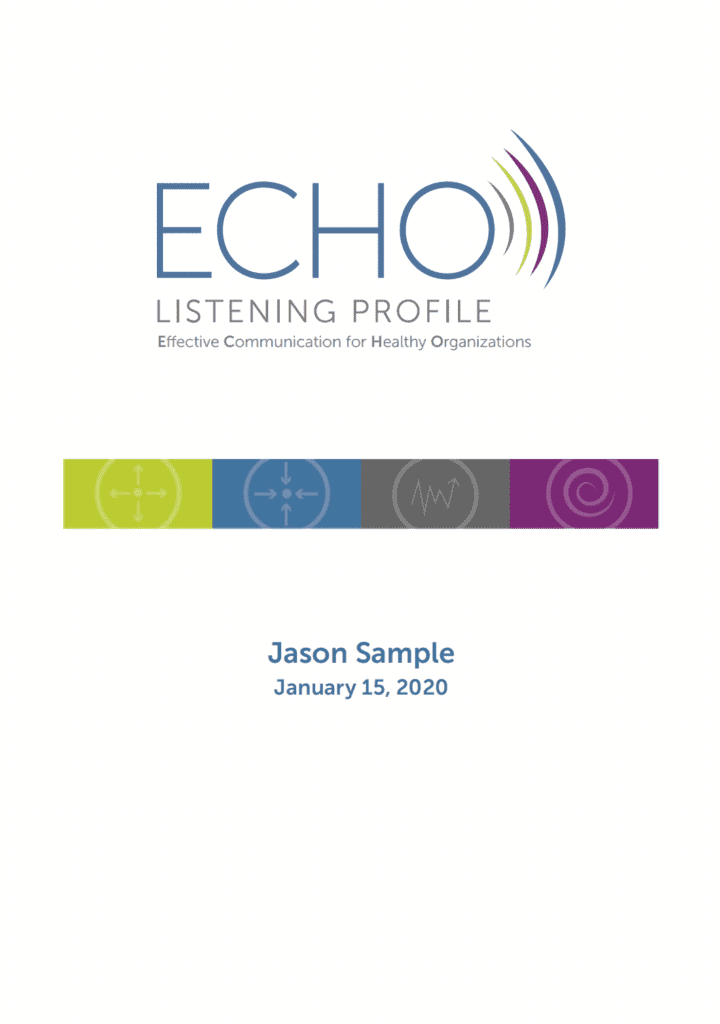Learn your Listening Style

Listening Styles - Learn why you listen
Research shows that we have a preferred listening style. While certain situations might demand that we listen for a specific reason, there is compelling evidence that we have an identifiable listening style that we will use is most situations.
There are four identifiable and measurable listening styles:
- Connective listening – This style focuses on the effect of information on others (team, clients, family, etc.).
People who are highly connective in their listening orient toward feelings over facts. They can even miss facts and details because of their focus on tone of voice, body language, and other relational cues.
- Reflective listening – This style focuses on how information affects the listener. People who are highly reflective in their listening focus on how the information may be useful to their own interests and purposes. Because of this, they may miss the information’s relevance for others.
- Analytical listening – This style focuses on facts and quantifiable data. This style wants to prove if what they are hearing is accurate or true. People who are highly analytical in their listening may miss or overlook feelings or other subtle cues.
- Conceptual listening – This style focuses on possibility and what could be. People who are highly conceptual in their listening are idea generators who love to brainstorm unhindered by structure or framework, but they may also miss important details along the way.
- Connective listening – This style focuses on the effect of information on others (team, clients, family, etc.).
We all have a little bit of each style. The goal is to identify which style or styles make up how we listen. From these four primary styles, there are 41 unique Listening Profiles based on how someone completes their assessment. The ECHO Listening Profile is a validated assessment that is designed to help anyone identify their listening style.
Once we identify our listening style, we can start to understand if we are missing certain information because it’s being filtered out by our style.
What does our Listening Style tell us?
Think of a person who you feel really understands you.
You might feel drawn to them when you are going through a difficult situation. Perhaps you find yourself telling them things that you normally wouldn’t tell others.

For this reason, you might feel comfortable reaching out to them and telling them what’s going on because they make you feel like they are really listening to you. Not just your words (although that’s a large part of it). They can listen to you and really understand your emotions.
This person has the Connective Listening Style. They listen to understand and gather information, but they also listen to understand another person’s emotions. They might not know that they have this style, but they might recognize that many people are drawn to them because of how they listen to others. They seek out the core meaning of the information that is being communicated and connect it to who might be affected by it.
This insight is useful for helping that person understand what they listen for, and it can also be useful for helping them grow too.
In our previous example, a person who has the Connective Listening Style is drawn to understanding the emotional appeal behind a message. They might unconsciously listen for emotion. However, there are many situations when listening for facts and evidence is a better approach. Someone who is unaware that their listening approach doesn’t allow them to critically evaluate while listening might have difficulty making decisions or drawing objective conclusions.
Learn Your Listening Style
The ECHO Listening assessment is an easy way for anyone to find out their Listening Style. Listening assessments are useful because they provide a non-judgemental way to learn about and improve our current listening skills. This assessment asks us to reflect on what we listen for, and our expectations on what we feel others should be listening for. The combination of these questions gives a person their style from one of the 41 Listening Styles.

In this report, a learner will understand their listening preference. Then, they will receive a narrative description of their listening style based on their natural approaches to listening. These insights lead naturally into a person’s strengths and areas of growth that they can develop on their own or with a coach, trainer, or facilitator.
Finally, the report provides a communication gap analyst that highlights situations in which the learner might be a good communicator and in ones where they could benefit from improvement. An action plan is provided to help them focus on their own personal development.
Purchase The ECHO Listening Assessment
Learn your Listening Style and find out how to improve your ability to listen.
Get started